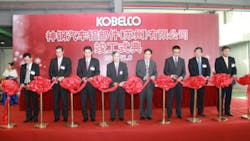Kobe Steel Ltd. held an inaugural event recently to commemorate the completion of its aluminum forging plant in China has completed its second-phase of development, and said all the equipment is in full production. The project was completed earlier this year after a three-year, two-stage development.
Kobe Aluminum Automotive Products (China) Co. Ltd. was announced in May 2010 as a joint venture of Kobe Steel and two trading companies, Mitsui & Co. Ltd. and Toyota Tsusho Corp. Its products are aluminum automotive suspension parts. The initial investment was estimated at $32 million. In its ownership structure and capital equipment KAAP China is a near duplicate of Kobe Aluminum Automotive Products in Bowling Green, KY.
KAAP China aims to supply China’s growing automotive manufacturing market, already the largest in the world and forecast to continue growing. Kobe Steel noted that China produced 19 million cars in 2012, and predicted it would increase that total to 30 million cars by 2022. Within that total is a rising demand for lighter vehicles to meet stricter fuel-economy standards. “As a result, demand for aluminum suspensions in China is rapidly increasing, mainly from Japanese, American and European carmakers,” Kobe Steel reported.
After construction of the aluminum forging line started at the site in Suzhou, Kobe Steel announced plans to duplicate the original installation with a second-phase development.
KAAP China’s first line — a 6,300-metric-ton mechanical forging press and heat treatment operation — started up in August 2012, with a capacity of 1.5 million forgings per year.
Now, KAAP China has added a second forging press line and doubled capacity 3 million aluminum forgings per year.
The second phase also included a melting furnace and billet casting line, so KAAP China now operates as an integrated plant. The additional investment was estimated at $57 million.
